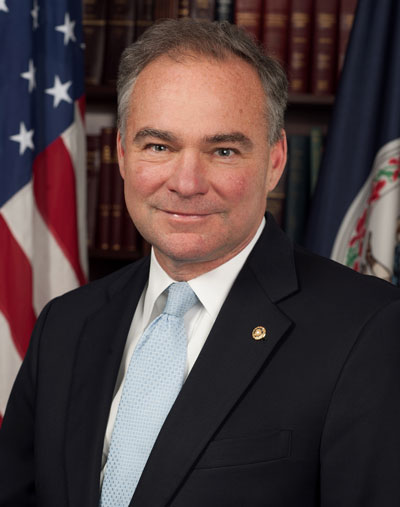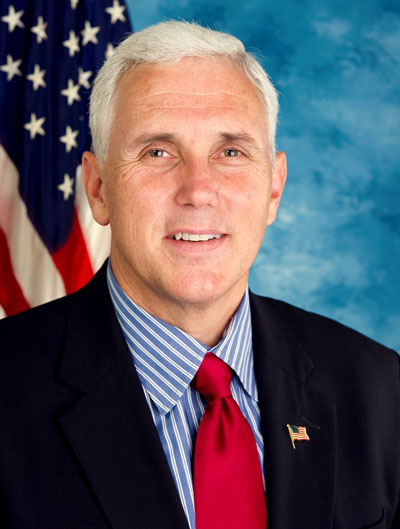History often shows us the George Washingtons and the Lincolns. But how often do we turn our eyes to the tails of the quarter (or the penny) – or the right-hand man to the leader of the Free World? Today marks the second debate in this Presidential election cycle and the only Vice-Presidential debate. After the last debate between Trump and Clinton raked in record-breaking views, the stakes are raised for Pence and Kaine. While we won’t have the incredibly entertaining jabs between Clinton and Trump to keep us glued to the action, all eyes should still be on these two very important men.
But who exactly are they?

Photo courtesy of Wikipedia
Tim Kaine, the Spanish-speaking, harmonica-playing Virginia governor and senator, was chosen by Hillary Clinton as her running mate. Met with a certain level of hostility by progressive democrats for his moderate-leaning tendencies, he gained popularity during the Democratic National Convention, coming off as the goofy “dad next door.” If you haven’t seen them, Kaine’s personality spawned an amazing series of dad jokes on Twitter, but what else is there to know about him besides the fact that he’s a really nice guy?
Education:
Kaine is no stranger to education policy. His wife Anne Holton has been the secretary of education for Virginia since 2014, and he has consistently pushed for cutting student loan interest rates. Together, Kaine and Holton have been starkly against high-stakes testing and the standardization of education. In an article for the Richmond Times-Dispatch, he stressed that education is about the individual and even the individual schools, instead of a one-size-fits-all standard. Kaine remains fully on board with Clinton’s debt-free college plan, but seeks to implement an income test to ensure richer Americans who don’t need assistance paying for college wouldn’t be getting free handouts. However, these kinds of test have proven problematic in the past due to the difficulty of accurately measuring need-based aid.Wages:
Kaine introduced the Raise the Wage Act to the Senate which would raise the federal minimum wage to $12 by 2020. While small businesses cry foul, students can rejoice about higher wages post-graduation – that is, if the bill passes.
Abortion:
Now here is where the Democrats are a little uneasy on Kaine’s straying from party lines. Tim Kaine, a Roman Catholic who served as a missionary in Honduras, is personally opposed to abortion, but has said that the government must uphold the decision of Roe v. Wade, affirming that abortion is a personal matter that the government shouldn’t interfere with. As governor, he has had a rocky past, promoting abstinence-only education and favoring adoption over abortion, but once Kaine entered the Senate he received a 100 percent score on NARAL’s (the National Abortion and Reproductive Rights Action League) Pro Choice records and Planned Parenthood’s scorecard. As senator, he has consistently fought bills trying to defund Planned Parenthood and restrict abortion, positioning himself along party lines.
Immigration:
Kaine’s Spanish-speaking skills weren’t his only appeal to minority voters; Kaine is fully on board for immigration reform. Kaine wants to give international students easier access to green cards after graduation from American universities and wants to accept more Syrian refugees into the country. Kaine also adamantly supports the DREAM Act and has demanded comprehensive immigration reform in his address before the Senate, making it clear that he stands by an earned path for citizenship.
Photo courtesy of Wikipedia
Mike Pence, the Indiana governor most commonly known for his anti-gay legislation and Washington political experience was chosen by Donald Trump as his running mate. In contrast to Trump’s brashness and impulsive nature, Pence offered that long sought, complementary level-headed temperament that conservatives desired for their presidential ticket – but even that has not shielded him from controversy. His addition to the Trump campaign spurred jokes from Twitter users, who quickly noticed the phallic imagery of the “P” in his last name. But the unfortunate logo slip-up doesn’t shroud the aura of seriousness he adds to Trump’s impulsive, brash campaign. What more is there to know about Pence than just his famous Indiana, anti-gay/pro-religion legislation?
Education:
Before being elected as Indiana’s governor in 2012, Pence did not have a long record with education in Congress. He cast a vote against President George W. Bush’s No Child Left Behind law in 2001, but his positions shifted when he became governor. He fought hard for preschool education funding for poor children in Indiana, facing pushback from the Republican party over government control over education. Pence has also long advocated for career and technical education by encouraging programs that place people directly in the workforce who don’t necessarily need a college degree for their career. He has voted against requiring states to test students and has pushed for more individual school choice. Pence seems undeniably relatable after racking up $280,000 worth of student debt on his own, but as a congressman he has rejected about $100 million for minority-serving institutions, keeping student loan interest rates at 3.4 percent, year-round Pell Grants, and rejected aid for students from working class and low-income families in the form of $40 billion in bank subsidies to Pell Grant aid. While his conservative stance on student aid may seem surprising and at odds with Trump’s arguments against the government profiting off of student loans, Pence’s actions do seem to coexist with Trump’s idea that the Department of Education should be eliminated altogether. Pence has also aligned with Trump’s plan to repeal Common Core, replacing it in Indiana as governor. He has also long supported Trump’s statement that “school choice is where it’s at, if you want to get your schools better.” In fact, under Pence’s governance, charter and private school vouchers and the voucher program in Indiana became some of the largest in the country.Wages:
Mike Pence has made several oppositions to raising the minimum wage throughout his political career, but most recently opposed a bill as Indiana governor that would raise the minimum wage from $7.25 to $8.25. He then proceeded to pass a bill that prohibits local governments from forcing business to raise the minimum wage.Abortion:
In stark contrast to Kaine, Pence was rated 0 percent by the NARAL, showcasing a flawless pro-life voting record. Socially conservative, Pence has decreased access to abortion in Indiana immensely. He signed a law stating a fetus could not be aborted if it had a disability and completely cut funding for Planned Parenthood within the state. Trump has been inconsistent on abortion rights since the early 2000s, making Pence’s crusade on Roe v. Wade a comforting place for Republicans fearful of Trump’s flip-flopping stance.Immigration:
Having voted yes for the Secure Fence Act of 2006 which called for building a fence along the Mexican border, Pence and Trump seem to have been a match made in heaven. Pence has suspended the relocation of Syrian refugees to Indiana and voted in favor of a bill that would report undocumented individuals if they receive hospital treatment. He has strongly supported the end of birthright citizenship, which would amend the 14th Amendment to the Constitution, and has co-sponsored bills declaring English as the official language of the U.S. Needless to say, Pence is all about sealing borders, complementing Trump’s anti-immigration campaign rhetoric.